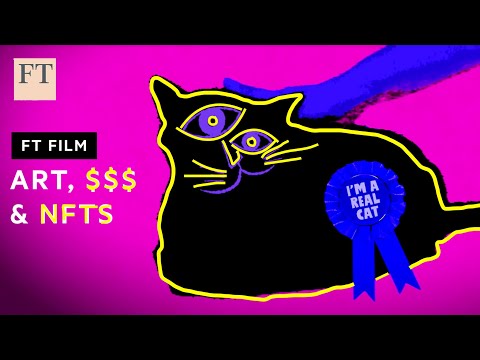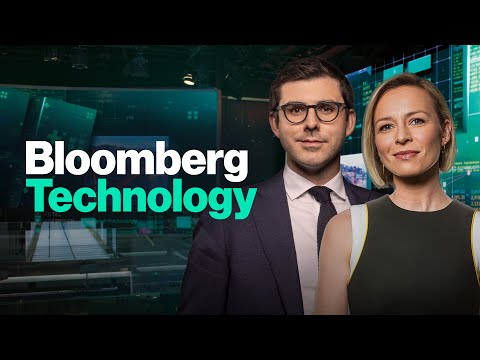Soaring NFT sales redraw the art market I FT Film

NFTs, those non-fungible tokens. What the hell's an NFT? Apparently, cryptocurrency. What's an NFT? It's is a really good question. A unique piece of content that's been created by an individual, obviously digitally. An NFT is a token that holds some information. This technology makes information unalterable.
What I am sure of is that sales of non-fungible tokens have soared this year, shaking up the traditional art world. Sales of NFTs have also drawn attention to digital art. A digital artwork by a relatively unknown American artist known as Beeple. It sold Thursday in an auction.. ...for $69.3m, making him one of the three most valuable living artists. Sotheby's sold a CryptoPunk, a pixel avatar, for some $12m.
Neither artwork exists the physical world at all, having been created entirely with digital technology. I think the most talented artists, in my opinion, of our generation are digital artists. And in the beginning I think that very few people ever collected digital art, right? No one really took it seriously because it was like, you know, I can see it for free. You know, why would I buy this, right? In the context of markets there's a traditional notion of unique property or a unique thing that's exchanged for value, that's swapped for value. And that's the basis of the art world.
You know, a painting is a physical object. It's rare. It's scarce. There's only one thing. And that can be a carrier of value.
Photography is endlessly reproducible. But in order for the traditional art market to give it some sort of financial value you need to sell a limited number of them. You need to make an edition and they need to be physically printed. Digital art, even more than photography, is not meant to be printed. So it's not that value didn't exist in digital art.
It's just that it couldn't accumulate financial value. And until now there was a problem with these works of art because you couldn't actually trade in them, because you didn't have any way of proving that you owned it. The ability to verify the provenance of a work of art has always been essential to the market. But how can you confirm ownership when the artwork doesn't exist in the physical world? That's where NFTs come in. The valuable artworks are the artworks where there are no red flags. It's not rocket science because if you've been a dealer, like me, I know exactly what the attributes are that create value for an artwork.
So clear title is crucial. Authenticity is very important, of course. Scarcity, that helps as well.
You wanna know how many paintings like this were actually painted by the same artist or where does it stand within the art historical field? So these digital artists, who I think are brilliant, had no real system of patronage and were kind of undervalued. And what we did back then is we started looking at Bitcoin and we said, well, if Bitcoin can prove that you can have something that's not tangible, doesn't exist physically, but it's limited, there's a provably scarce amount of it, and you can prove that there's ownership to it, can't we apply that to digital art? An NFT was sold by Christie's by the graphic designer Beeple for $70m. And all of a sudden the art world woke up and looked around and thought, what on earth are NFTs? An NFT is a non-fungible token. When you buy a house you get the deeds. When you buy a Picasso you get a certificate of provenance.
In this new world, when you buy a work of art, what you're actually buying is the NFT, proof that it belongs to you. The proof is written in the blockchain. It's a virtual ledger that records the transaction and cannot be altered. But an NFT can be traded. And these crypto certificates are changing the art market, with digital creators selling their works for huge sums.
Because now, for the first time on the internet, you can really own something and you can trade it on any market you want to, including ours. So currently we're seeing a lot of really exciting activity around digital art. And it's sort of forming a brand new market that never really existed. But NFTs go far beyond that.
So things like event tickets, game items, domain names, all could potentially be turned into NFTs. Anything you want. An artist can make an NFT and put in the contract that if you buy this piece of art it allows you to have dinner with me. It allows you to come to my studio and I'll do a self-portrait. It allows you to get the paint buckets that I used. I'm sure if NFTs were around when Jackson Pollock was around and you could get the empty paint buckets, that those paint buckets today would be worth just as much as the damn paintings.
This is a game-changing technology because of the contract underneath the collectible. So it's not just digital assets. You can use NFTs to trade full or part ownership of physical assets to anything from paintings to sports highlight reels to sports cars. So I'm up on the second floor. Yeah, I've been very lucky to have this space through the pandemic.
I'm very curious about NFTs. What I like about NFTs, my personal romantic vision of it, is it's the wild wild west. For me, I'm very curious to see what artists do with it. You know, it's still in its early days. You know, can a poet read a few lines of their poem and have their voice be embedded in that NFT? Can I incorporate parts of my process? Can I incorporate parts of my inspiration in a video form? Like some of these colours are inspired by graffiti work I've seen around my neighbourhood? Is there a way to incorporate some of that that people don't get when they just see my painting? That's what I'm most excited about.
I had a discussion with my students recently about NFTs. They're very curious. It seems like many of them don't know much about it.
But in terms of art making, if you're 15 you have a voice. You have things you wanna say and you can say them and an NFT may give them a wider platform, just like social media has given them a wider platform. An artist who's young today is going to get educated.
They're 25 years old, there was no option for them not to use the high market art world infrastructure, a gallery, an auction house. I believe this gives them options. I've always felt, when I was in the art market, that we were excluding so many people. It was not an inclusive market. We built these little temples for art.
We create art fairs with only champagne and caviar. It was not a very inclusive world. Hey. How are you? Good. How are you?
Good to see you. Nice to see you in person. Yeah, I know. Thanks for meeting. And we showed together in Times Square, right? We did. So you were part of Cube's Art Fair show.
How crazy was that? It was amazing. So since the campaign a number of my clients talk to me about how I just literally needed to put everything else on hold to focus on NFTs. And I was like, OK. I'm busy enough as it is. That's not even possible.
But then, once I brought in this mentor, Crypto Sensei, and he started just kind of showing me what I could do with it, I was like, oh, OK, actually. So are you my crypto sensei? Is that... I guess I could be your baby sensei or something? I'd have to ask Crypto Sensei. Do you think you'll be ready? That is the plan.
I haven't said it out loud yet. Yeah? Well, let's do it. That's the plan. Awesome.
Oh, come here for a sec. So maybe I need to clear some of this out. So honestly, probably the most confusing part wasn't even the minting and listing part, it's really just understanding how to set these initial things up... Sure. ...how to resize your images so that they fit the requirements, say for like OpenSea. Right.
You know? But once I show you, you'll be like, it's not that bad. OK. Yeah. OK. So let's say now we have $400 of Eth in your account and you're like, OK, I want to go mint three NFTs tonight, now one of the things you have to keep in mind is, with your images, you need to have...
every platform has its own size requirements for the files or the NFTs that you're selling. So the platform that we're going to be using in this is OpenSea. Thank you. Of course.
Here's a couple. So this is one of the pieces that I'll be dropping in the coming weeks. Random thought. You know, I've heard a lot of people talking about where the NFTs might go and, I mean, even cryptocurrency too. And then I have a lot of friends who push back, being pretty traditional artists, and even students who say like, it's just a fad. This is dumb.
It's not real art. I think it's super powerful in that it really... traditionally, in the art world and the artist-gallery relationship is one where the artist is sort of on the periphery of the transaction.
Like we talked about that. We'll sell a painting through a gallery and we often don't know who it's sold to, for how much, and then as it's sold down the road, that information isn't... we don't have access to that.
This gives artists the ability, now, to sort of be at the centre of the transaction and have control and oversight over their work in ways that we've never had. For an artist earning a steady income isn't always easy. But what if you earned money not just the first time you sold your artwork, but every time? A royalty payment triggered by each secondary sale built into the NFT? Every time there's a secondary sale... today, the standard is about 10 per cent of that sale... goes back to the original artist, which is amazing, because all my art friends... as a failed artist and all my art
friends, in 40 years, I had never knew... I knew one artist who actually lived off of just making art. All the other ones were either teachers or did something else. Every time that piece of art sells the artist is going to make money. So they're winning on two new fronts, a bigger percentage of the upfront sale and the ability to make royalty on every concurrent sale, in perpetuity. I think we're going down the road of more content creators monetising their skills and their talents and finding ways in which that they can be paid for that and here's a verifiable way to do that.
So it's very intriguing. So NFTs are making the art world more accessible and that's a good thing. But I'm still struggling with the idea that you can spend millions of dollars on a work of art that you can't actually touch with your own hands, that can be reproduced endlessly at the touch of a button and that everybody else can see any time they like.
I really don't think there's a difference between someone buying a Gauguin and putting it above their couch and someone buying a Beeple and posting on social media that they own it. It's the same. Ownership is a stronger claim over something than a like, right? Social currency, it's why Mercedes and Nike matter. It's also how you express yourself. When you buy a very expensive painting and you put it in a warehouse in Morocco for tax reasons how many people are you showing that you have it? I love this farce that you have the physical. Most of the most valuable stuff sits in warehouses.
What are we talking about? When you do it digitally everybody knows. Now, ladies and gentlemen, comes the opportunity to purchase. So who's buying? Art lovers or speculators? You know, who knows what motivates buyers? Lots of things motivate buyers. And so far, in this market, buyers that aren't so much concerned around what it is that they're owning, because the utility of the piece is to transact with other people. The majority of buyers are paying with cryptocurrencies.
And of course, when the Beeple sold Christie's accepted cryptocurrencies. They accepted either Ether or Bitcoin as payment. So most of my clients span the ages of 28 to 42. So we're talking pretty young, as a relative measure to where most of the wealth is concentrated, with baby boomers and older individuals, right? So blockchain technology, cryptocurrency is now NFTs, which is built on blockchain, is right up their alley as folks looking for new asset classes and new ways to invest.
"Everydays, the First 5,000 Days" sold at Christie's for $69.3m. That's a hell of a lot of money for a living artist. The money is crazy and awesome. And I think it's going to do a lot of good. Huge sales generate a lot of publicity. But are NFTs really here to stay or a bubble ready to burst? We're in a hype cycle that, right now, NFTs, in their design, are ripe for speculation.
Because now that the art is not even physical, that you don't even have to deal with storing it, that it's just a Jpeg, and all of the innovations around NFT are around their exchange, we have gotten to a point where we're essentially day trading culture. People are going to try to take advantage of it. That's our DNA, or that's many people's DNA. So will people come up with things and throw everything in the NFT space? And will there... I think, will there be a cleaning the house? Probably yes.
I would think so. I don't think anything that is NFT is pure gold. Also, people who own cryptocurrencies, they don't have an enormous number of things that they can spend it on. You can't use it as easily as you can use fiat currency, which is, i.e. dollars, euros, pounds, whatever. So I think this has had quite an influence on driving up the market for NFTs recently.
What I think you're looking at is a 1999 internet moment. Let me explain. I'm going to give you the prediction right now, because I'm old and I see the patterns. This next 6 to 12 months, greed will take over. Everybody will put out NFTs.
People will buy, trade, sell, steal, rip off, try to trick you and do the wallet. There'll be so much happening. Some people will make fast money. It will collapse.
There is an absolute guaranteed NFT winter coming. And what's going to happen? I'm going to be buying NFTs during that time, building NFTs, because I know behind it is exactly what happened with the internet. And this happened with personal computers. Apple had these moments in the early '80s. This is what always happens with the biggest technologies. Overall sales of NFTs surged in the third quarter, reaching $10.7bn.
That includes art, but also videos, collectibles, and even assets in virtual worlds. It's easy to be a believer when you're making money. But we should also remember that this technology is still young and there are bound to be challenges. When that big Beeple sale came in and all the attention came in, people were like, wait a minute. This stuff's really hard to use. I thought it was supposed to be like democratised and I'm confused and I can't figure this out.
The big things today are just getting cryptocurrency takes a long time. You have to hook up your bank to something like Coinbase and get some currency. So a lot of people compare NFTs to buying an asset or a right to a copyright.
But actually, there are no copyrights associated with an NFT. There might be in the future. But at the moment, it is essentially a contract between you and the artist.
Then, you have to get your head around, when I want to send this currency somewhere, there's a gas fee. So some of your money starts to disappear and you're not really sure why. You have to be careful. This is a speculative world market.
It's very linked to cryptocurrencies. And it's going to be volatile. And then you need to instal a MetaMask wallet if you're going to collect these Ethereum NFTs. This is like a lot for most people.
And then you have to make sure that you don't ever lose your code, because there's no help line. If you lose this code, you're not ever going... you own these things. And if you lose the code you're in trouble. Good morning.
Why, hello there. I'm good. How are you? I'm good. I have some news.
What? I sold my first NFT. Congratulations. Thank you. Three days. Awesome. Isn't it like, once you've done it, you're like, whoa and it's like it clicks in? My mind is completely blown.
I figured this one would be like, I don't know, maybe I'd go beg someone. Mum, come on. Get a crypto wallet. This is a guy who bought a couple of paintings a couple years ago, but I had a bunch of other people reach out that I've never met and other collectors who are interested. And so it's been good. I think this whole thing, this whole movement, NFT movement, is like about empowering artists economically.
Yeah. So I feel like we're just, I mean, really, are at the beginning of NFTs. And then we're also at the beginning of this wave of artists from the traditional art world coming in.
Correct. Yeah. Well, and I love seeing what you're doing. You have more dropping too.
Thank you. Yeah. So I'm thinking of just doing some small drops. But then, December 1st, I'm going to do a big drop at Art Basel. I'll see you in Miami.
We'll have to celebrate in Miami. We'll celebrate in Miami. All right. A lot of people are in the NFT market to make money. New markets attract speculators.
That's nothing new. But you must remember where there's money to be made, there's money to be lost. For the artists themselves, however, this new technology is opening doors. It's just not clear yet where those doors will lead. All right. So there's been a huge update for me.
The person who bought "ourobouros," my first NFT, relisted it for a lot more money. It was sold for 1 Ethereum, 1 Eth, at the time about $3,900. And now, it's listed at 101 Eth, which is $380,000-something.
So yeah, it kinda blew my mind a bit, again.
2021-11-30 01:10


